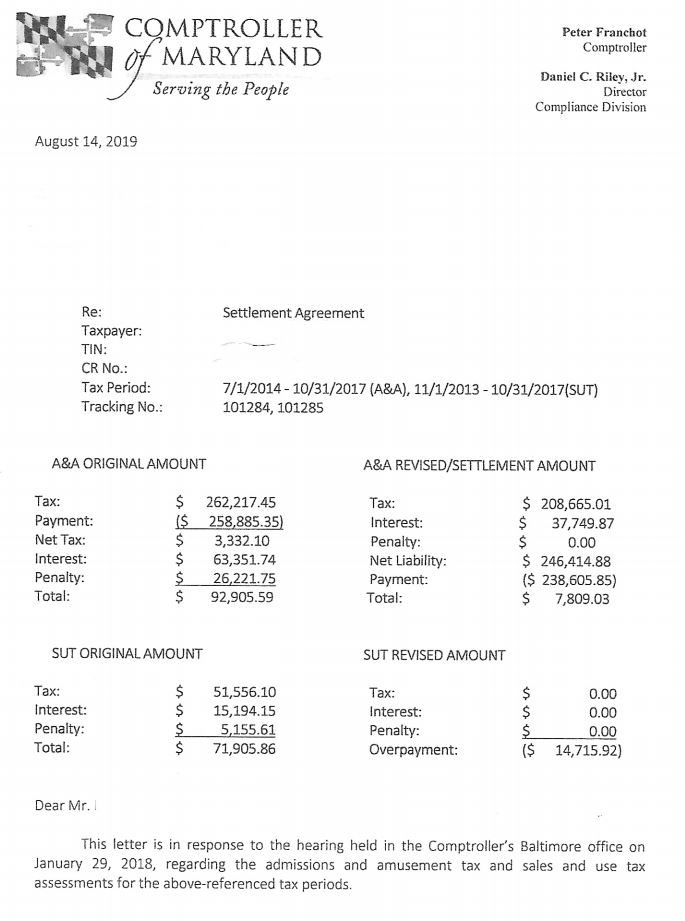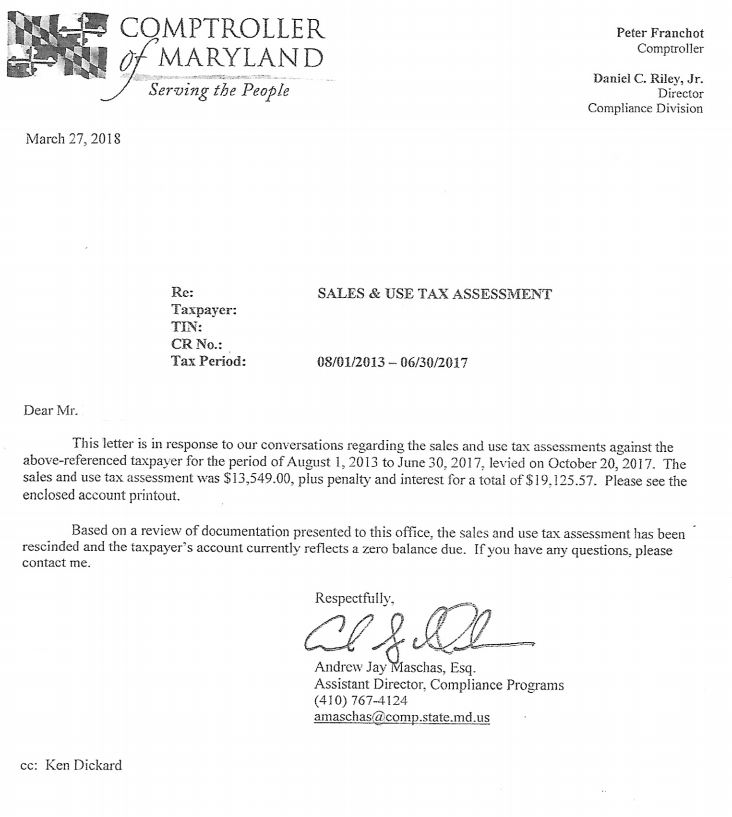MD Sales Tax Assessment Amount – $51,556.10
Reduction Amount – $51,556.10 – 100%
Interest and Penalty Savings – $20,349.76
Refund Check Amount – $14,715.92
MD A&A Tax Assessment Amount – $262,217.45
Reduction Amount – $53,552.44 – 20%
Interest Savings – $25,601.87
Penalty Savings – $26,221.75
Maryland golf course was selected by the Comptroller’s Office for a Maryland sales and use tax and admissions and amusement tax audit. This taxpayer had been audited before for sales and use tax, but this time the audit was trigger by non-payment of admissions and amusement taxes. The number one issue that triggers an audit more than anything else is failure to file returns. Marsu was contacted by the Taxpayer’s lawyer to review the completed workpapers. Taxpayer had calculated the amount of admissions and amusement taxes that were due and submitted a check prior to the audit workpapers being finalized. I am assuming the Taxpayer did this to stop interest from accruing. Since the Taxpayer had received their Notice of Assessment, the case could not be reviewed in the field, so the lawyer filed for an informal hearing. Marsu did the following for the asset, sales, expenses and lease audit schedules for the sales tax audit and the admissions and amusement calculation schedule for the admissions and amusement tax audit:
- The auditor reviewed every asset purchased during the audit period and only listed 7 invoices. Marsu was able to obtain a copy of one (1) of the invoices to prove that sales tax had been paid to the supplier. The tax assessed was reduced from $2,007.56 to $1,932.39, a savings of $75.17.
- For expenses, the auditor reviewed a three month sample period and listed 38 invoices. Marsu reviewed each line item and provided documentation to the hearing officer to get 15 lines deleted from the workpapers. Documentation included contracts, account number information and copies of invoices. The tax assessed was reduced from $14,126.08 to $5,398.20, a savings of $8,727.88.
- For lease schedule, the auditor reviewed all leases and listed two (2) leases. Marsu presented copies of invoices from one of the leases where sales tax was paid. The tax was reduced from $18,062.85 to $13,424.64, a savings of $4,638.21.
- For sales, the auditor listed the revenue from the accounts that were taxable for the audit period on a yearly basis and totaled all taxable sales and subtracted the sales tax remitted to calculate the tax assessment. Since alcohol sales were involved, there was a 6% and 9% tax assessment schedules. Marsu reviewed these schedules and determined that not all the proper accounts were included and not all the sales were taxable sales. Marsu documented the additional accounts and the non-taxable sales to the hearing officer and the schedules were reduced. The 6% schedule was reduced from $18,062.85 to a refund of $13,544.42, a savings of $31,607.27. The 9% schedule was reduced from $2,413.37 to a refund of $10,710.04, a savings of $13,123.41.
- For admissions and amusement taxes, the auditor listed the revenue accounts that were taxable for the period to calculate the 10% tax that was due. Marsu reviewed this calculation and determined that not all sales were taxable and then provided documentation for those non-taxable sales to the hearing officer. The tax was reduced from $262,217.45 to $208,665.01, a savings of $53,552.44.
Main Audit Issues
Over the years, Marsu has reviewed several audits of golf courses for sales taxes. I believe they are a favorite target of the Comptroller’s Office because they are auditing for two taxes at one time, for sales taxes they are auditing that the 6% and 9% tax is collected properly, and that the industry purchases a lot of equipment from out of state suppliers and use tax is not always paid.
The first issue here was that the Taxpayer was not filing their admissions and amusement tax returns. That is a red flag for the Comptroller’s Office and they will always perform an audit to get their money. Taxpayers should always file tax returns and pay timely so you do not attract attention to themselves and get audited.
The second issue was that the Taxpayer was not paying any use tax. This was at least the second audit for sales and use taxes and re-audits is one area that the Comptroller’s Office obtains audit candidates from. The Comptroller’s Office will review the payment history of Taxpayers who were audited in the past ten years or so and had large assessments. A certain percentage of them will be selected for a re-audit to confirm that the Taxpayers made changes from their last audit to be in better compliance with collecting and paying use tax.
Click Here or Image Below to Read Full Letter

MD Tax Assessment Amount – $65,265.81
Reduction Amount $18,977.58 – 29%
Refund from Reverse Audit – $14,595.52
Admissions & Amusement Tax Refund from Taxpayer- $10,638.56
Sales Tax Refund from Admission & Amusement Taxes from Taxpayer – $7,196.43
Interest Savings – $19,070.72
Maryland Taxpayer who has several catering locations throughout the Baltimore Metropolitan area was selected for another sales and use and admissions and amusement tax audit. This Taxpayer was last audited in 2004 and Marsu also assisted in that audit. Taxpayer is very well versed in the proper collection of sales taxes and in the payment of use and admission and amusement taxes. The Taxpayer just received the audit workpapers for the sales and use tax audit and there was no assessment for the admissions and amusement tax audit, but the Taxpayer discovered two refunds from the admissions and amusement tax audit that they were putting together to submit to the auditor so it could be incorporated into the audit. The Taxpayer contacted Marsu to review the sales tax audit to determine what, if any, adjustments could be presented to the auditor. Marsu did the following for the asset and expense schedules:
- For assets, the auditor reviewed all the asset purchases for all locations for the audit period and listed 42 invoices as taxable. Marsu reviewed each invoice and discovered that use tax had been paid on 7 of the invoices that the auditor missed in his review and 7 other invoices that were not taxable. The tax assessed was reduced from $6,945.08 to $4,069.38, a savings of $2,875.70.
- For expenses, the auditor only looked at a one-month sample for all locations and listed 65 invoices as taxable. Marsu reviewed each invoice and documented that 2 invoices were non-taxable and got 3 lines deleted and assessed on an actual basis for each supplier for the audit period. The tax was reduced from $58,320.73 to $42,218.85, a savings of $16,101.88.
After the review of the workpapers, Marsu performed a reverse audit and documented sales and use tax paid in error and the Comptroller’s Office approved and included Marsu’s refund in the amount of $14,595.52 and the refunds filed by the Taxpayer in the workpapers as required by law. The original workpapers had the Taxpayer owing $65,265.81 in taxes and the final workpapers had the Taxpayer owing $0 in taxes, a savings of $65,265.81. Since the audit had a $0 amount of tax due, there was no interest and penalty due. From the original workpapers, the taxpayer saved $19,070.72 in interest because of the refunds approved from Marsu and the Taxpayer.
Collection of Tax by Caterers
This Taxpayer has been 100% compliant in the collection of sales taxes in the past two audits that Marsu has been involved in. That is a testimony to the great job that this Taxpayer is doing in this area. Caterers are to collect tax on almost every line item that is included in the bill. The main exception is the hall rental charge if separately stated. Usually most caterers do not have their computer system’s programed to collect tax on some labor or rental charges and then gets dinged for failure to collect sales tax when audited by the Comptroller’s Office.
Main Audit Issues
The only minor audit issue here is that the Taxpayer sometimes misses paying use tax on some of its assets and expense items. I mainly chalk this up to clerical errors because the Taxpayer does a decent job of paying use tax. One thing that Marsu recommends and this Taxpayer does is after an audit is to call up the MD suppliers who did not properly collect sales tax and inform them that they should be collecting tax. That way in the future the Taxpayer will be properly paying the tax to the supplier and does not have to worry about accruing use tax and possibly missing it again and it being included in the next audit. Because this Taxpayer knows they will be audited again.
The majority of the expense items included in this audit were items that were deleted in the 2004 audit because they were for resale and the Comptroller’s Hearings and Appeals section agreed. The auditor in the audit section was just following their guidelines which comes from a 2006 Maryland Tax Court Case that stated that similar items were taxable. Recently, the Comptroller’s Office has issued a Business Tax Tip that discusses the taxability of different expense items that a caterer uses to cater an event. This Tax Tip just confirmed the ruling that this Taxpayer received in their 2004 audit and has been following ever since.
Call Marsu
If you are a caterer and have been audited in the past, then please call Marsu now to determine if your case can be reopened pursuant to Section 13-509 of the Annotated Code of Maryland to get any taxes improperly assessed back as a refund or if you are just due a refund of sales and use taxes paid in error. Marsu’s review is performed on a contingent basis and no fee is due if no refund is approved by the Comptroller’s Office.
Click Here or Image Below to Read Full Letter



